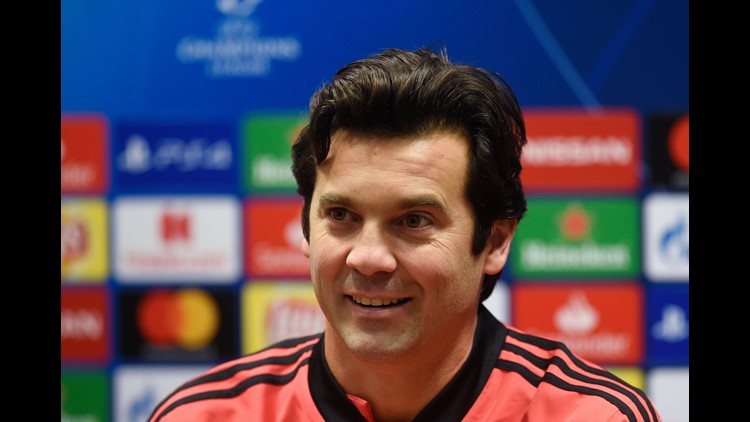Real Madrid has announced that Santiago Hernan Solari will take over as the club’s permanent coach, after a record-setting start in the job.
“The Board of Directors of Real Madrid CF, meeting today November 13, 2018, has agreed to the appointment of Santiago Solari as coach of the first team until June 30, 2021,” said a Real statement on Tuesday.
The 42-year-old Solari took over on a temporary basis when Julen Lopetegui was sacked on October 29 and has won all four of his games in charge — the best start of any manager in the club’s history.
Real was forced to make a quick decision on Solari’s future because the Spanish league prevents interim coaches from staying in the position for more than two weeks, meaning the club had to either appoint him or find someone else by Tuesday.
Previously the Real Madrid B coach, Solari’s side has scored 15 goals in four victories and has closed the gap on La Liga leaders Barcelona to just four points.
‘El Indiecito’
Real president Florentino Perez has form when it comes to promoting a Real Madrid B coach to the top job.
Zinedine Zidane left his role as Real boss in May this year having led his former club to nine trophies in a two-and-a-half year spell, including three consecutive European titles. He too had coached the Real Madrid B team.
Born in Rosario, Argentina — also the birthplace of Lionel Messi — Solari was educated at New Jersey’s Richard Stockton College in the US, which partly explains why the 42-year-old’s English is so good. He likes to read in English to retain his ability to speak the language.
Solari’s father Eduardo played professionally in Argentina while his brothers David and Esteban also pursued football careers, as did his cousin Augusto.
Solari was nicknamed “El Indiecito” — “the Little Indian” — which is a nod to his uncle, Jorge Solari, who played in Mexico and was nicknamed “El Indio.”
‘Sexiest player of the year’
In Argentina, Solari’s career took off at River Plate, where he won the Libertadores Cup in 1996. Three years later he made the move to Spain, joining Atletico Madrid.
When Atletico was relegated in 2000, Real moved to sign the Argentine winger. That was the era of the “Galacticos” and Solari played alongside the likes of Zidane, featuring in 204 games and scoring 22 goals in five seasons as a merengue
He won the Champions League in 2002 — it was Solari that started the move that led to Zidane’s breathtaking volley against Bayer Leverkusen in the final in Glasgow — as well as two La Liga titles, two Spanish Supercups, one European Supercup and an Intercontinental Cup.
It wasn’t just football trophies that Solari won at Real. In 2002, Canal + viewers voted him “The sexiest player of the year.”
“I thank the people who voted for me, but I’m sure it’s rigged,” Solari quipped. “We’ll see if I’m offered another career in the film industry when I leave.”
Intensely private
In 2005, Solari joined Inter Milan and was part of teams that won three successive Serie A titles, before he headed back to South America and played for San Lorenzo, Atlante and Peñarol.
Solari has been described as “highly educated, articulate, philosophical and a lover of books.” After retiring he wrote a column for leading Spanish newspaper El Pais.
Married with three children, Solari is intensively private and has no visible social media profile.
Back in Europe, he started his coaching career by working with Real Madrid’s junior teams, before taking charge of Castilla — the club’s B team — in 2016.
Under Solari, Castilla’s results have been mixed — in his three seasons in charge, the team finished 11th and eighth and is currently fifth in their group.
What type of coach will Solari be at Real? Perhaps an interview he gave to El Gráfico magazine provides a clue.
“First you have to see what skills and what characteristics the players have — who are and will always be the owners of football — and afterwards know how I want to play, the style.
“Later, the football culture of each country, the competition, the opponent, the pitch, the tactics, etc. all influence. All of this is more important than the tactical formation. You can play with a 4-4-1-1 that’s very attacking or a 3-4-3 that’s very defensive and vice versa.”



